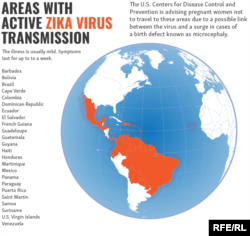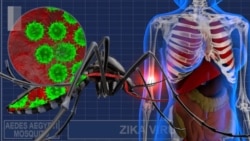The World Health Organization reports evidence is accumulating of a causal link between the Zika virus and two neurological disorders - microcephaly, which causes brain abnormalities in newborn babies - and Guillain-Barre Syndrome, which can result in paralysis.
The latest update shows 47 countries reporting transmission of the Zika virus. Of those, nine countries, mainly in Latin America, are reporting a potential association between the Zika virus infection and cases of Guillain-Barre Syndrome.
The WHO says Brazil is still the only country where it is proven that women infected with the Zika virus have given birth to babies with microcephaly. It says a linkage is suspected in 641 cases.
Bruce Aylward, the WHO's executive director for outbreaks and health emergencies, says a study from French Polynesia presents the most compelling evidence to date linking Guillain-Barre Syndrome with the Zika virus. Aylward says scientists have studied cases which occurred in 2013 and 2014.
“What they found was 100 percent of the people that had Guillain-Barre had evidence of infection and then …that again is the strongest evidence so far that this may be a causal relationship," he said.
Guillain-Barre Syndrome can cause a rapid onset of paralysis, usually involving the lower limbs, so people are unable to walk. The neurological disorder progresses very rapidly, but the majority of people recover.
Aylward says the risk of contracting Guillain-Barre is very low, with about one in 5,000 people becoming sick.
WATCH: Research on Zika cure
He says a recent report from the U.S.-based Centers for Disease Control and Prevention provides more evidence of a possible causal link between Zika and microcephaly. He says the CDC has been following the cases of nine pregnant women who became infected while traveling.
Aylward says three of the nine pregnant women have given birth to babies with microcephaly, adding to the accumulating body of evidence linking Zika to the brain disorder.







